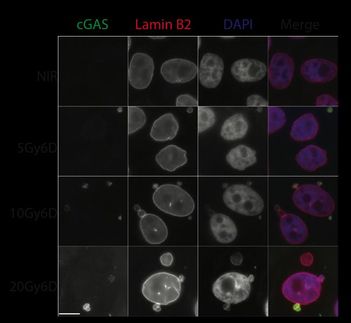Small addition to cancer drug may make big difference
University of Florida researchers have found a way to use just a fraction of the normal dosage of a highly toxic, debilitating chemotherapy drug to achieve even better results against colon cancer cells. More research is needed before the therapy can be tested in patients, but the discovery in human colon cancer cell lines and mice with established human tumors suggests that the addition of a small molecule to the cancer drug Temozolomide disrupts repair mechanisms in a type of tumor cells that is highly resistant to treatment. The discovery will be featured in Molecular Cancer Research.
“This is very important because aside from aggressive surgery with possibly chemotherapy, there are no specific treatments for colon cancer,” said Satya Narayan, a professor of anatomy and cell biology at the College of Medicine and a member of the UF Shands Cancer Center. “The recurrence rate for this type of cancer after surgery is very high, about 30 to 50 percent, and there is an urgent need to develop new approaches to manage this deadly disease.”
Narayan’s research team evaluated more than 140,000 small molecules, finally arriving at a tiny molecule that precisely blocks the ability of cancer cells to recognize and repair the DNA damage inflicted by Temozolomide, or TMZ.
“Our idea was if you induce DNA damage (with TMZ), and at the same time block cell repair, you can synergize toxic effects to the cancer cells,” Narayan said. “We hope that with this combination treatment we can reduce the tumors drastically and expand the lifetime of patients much longer than is currently possible.”
TMZ is commonly used against certain types of brain cancer. It works by damaging the DNA of the cancer. However, the challenge of treating patients is that colon cancer is not a single disease but an array of disorders with distinct molecular mechanisms, with one type being quite proficient at repairing the DNA damage inflicted by the drug.
By combining TMZ with the small molecule, Narayan’s team was able to disable the colon cancer’s ability to manufacture repair enzymes. The UF researchers effectively used an amount of TMZ that is about 10 times lower than recommended in its studies of mice with human colon cancer tumors.
If only about one-tenth as much TMZ is needed to kill cancer cells, Narayan said, it will be possible to use lower doses of a drug that creates a great deal of adverse side effects, a partial listing of which includes anxiety, back pain, breast pain, constipation, cough, diarrhea, dizziness, drowsiness, dry skin, hair loss, headache, joint pain, loss of appetite, mouth sores, muscle aches and nausea.
Most read news
Topics
Organizations
Other news from the department science

Get the life science industry in your inbox
By submitting this form you agree that LUMITOS AG will send you the newsletter(s) selected above by email. Your data will not be passed on to third parties. Your data will be stored and processed in accordance with our data protection regulations. LUMITOS may contact you by email for the purpose of advertising or market and opinion surveys. You can revoke your consent at any time without giving reasons to LUMITOS AG, Ernst-Augustin-Str. 2, 12489 Berlin, Germany or by e-mail at revoke@lumitos.com with effect for the future. In addition, each email contains a link to unsubscribe from the corresponding newsletter.
Most read news
More news from our other portals
Last viewed contents

Faecal Pollution: DNA Uncovers Culprit - CSI and forensics can be used to uncover not only serial killers but also the cause of water pollution
Chinese_Mental_Health_Association
Catalent Invests $7.3 Million in Italy - Expands Softgel Encapsulation and Packaging Capabilities in Support of Consumer Health

Bioluminescence - the natural glow - How glowing molecules can also be used in industry
2006 Life Science Industry Awards Finalists
Category:National_Institutes_of_Health_images
Energy sensor as potential target for cancer drugs identified
VaxGen Raises USD 79M Through Sale of Interest in Overseas Biopharmaceutical Manufacturing Facility






















































